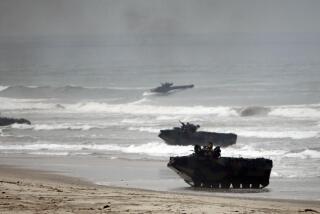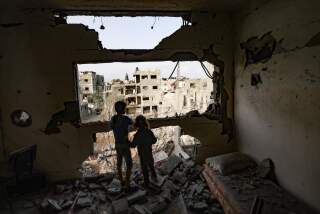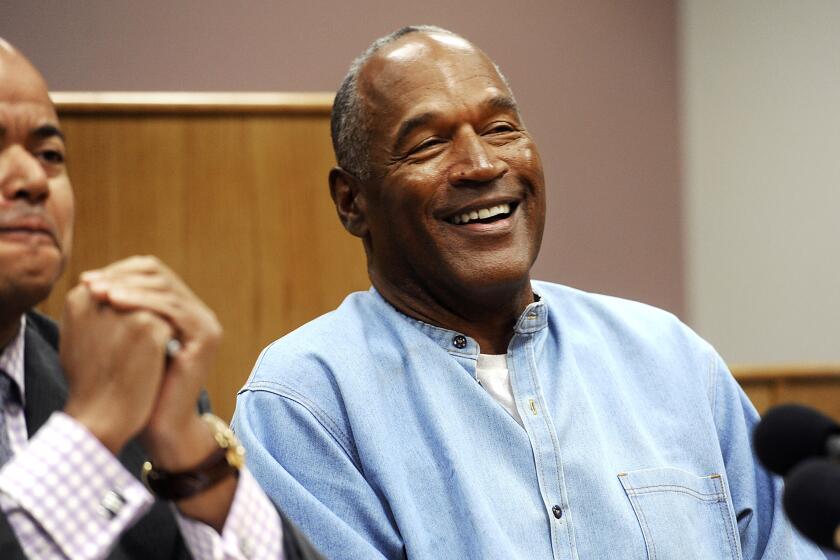Some of the war’s battles are fought at home
Six-year-old Keegan Ramirez knows that his father, Marine Sgt. Rafael Ramirez, is in Afghanistan.
But there is nothing unusual about that. The Ramirez family lives in base housing, where nearly all the fathers and some of the mothers leave home regularly for seven to 12 months at a stretch.
Sgt. Ramirez, 27, is with an artillery battalion in the Taliban stronghold of Helmand province. He has made three other deployments to Iraq to the insurgent-battleground of Anbar province.
Recently, Keegan has come to understand an inescapable fact about his father’s chosen profession: Not everyone comes home alive or uninjured.
“We hadn’t heard from his father in a couple of days,” said Keegan’s mother, Emma Ramirez, “and Keegan came to me one night and asked, ‘Did daddy die?’ It broke my heart.”
Children have had to grow up quickly in the last decade at Camp Pendleton.
On Friday, it will be exactly 10 years since the Marines from Camp Pendleton landed in the Afghanistan desert one starry night, the first conventional U.S. troops into Afghanistan after the Sept. 11 terrorist attacks.
Nearly every facet of the base has changed over the decade as Marines deployed to Afghanistan in 2001, then to Iraq in 2003 and back to Afghanistan in 2008. There’s a new Wounded Warriors Barracks, and a five-story, $450-million hospital is under construction.
“We’ve never really stopped,” said Lt. Gen. Thomas Waldhauser, who led troops in combat in Iraq and Afghanistan and is now commanding general of the 1st Marine Expeditionary Force. “There was never a lull.”
But possibly the most profound change in the last decade has involved the relationship between the Marine Corps and its families, the spouses and children who stay behind.
As part of that change, the five elementary schools on base have scrambled to use counseling and special lesson plans to help students like Keegan Ramirez cope with the fear and stress of having a parent in a war zone.
Some 345 Marines from Camp Pendleton were killed in Iraq and more than 50 have been killed in Afghanistan. More than 3,000 have been wounded.
“My children haven’t known a time when their father was not gone,” said Lelia Brady, 34, who has an 8-year-old daughter and 9-year-old son. “To them, their dad is always at war. He leaves soon for his seventh deployment.”
Tears and joy
The tears of departure and the joy of homecoming are constant features at Camp Pendleton, the region’s largest employer and home to more than 42,000 active-duty troops.
Along the fences at the base’s entry points are homemade signs greeting Marines and sailors returning from deployment: “Welcome home Daddy! Can I have a puppy?” “Robert Charles You Make Your Mother Proud” “Marry Me, Cpl. Garcia.”
Monuments to the fallen, formal and informal, also dot the 195-square-mile base.
It is not uncommon to see Marines and sailors with tattoos listing the names of buddies killed in Iraq or Afghanistan. Some cars and trucks have decals in the back window spelling out a name, the appropriate dates and the epitaph KIA, killed in action.
Death, injury, anxiety and prolonged separations have become a way of life at Camp Pendleton.
“It’s become our new normal,” said Meghan Jones, 33, whose husband is a gunnery sergeant. “For most of us, it’s all we’ve known.”
The Marine Corps has hired 141 full-time family readiness officers for the 55,000 Marines at Camp Pendleton and other bases in Southern California and Yuma, Ariz. A survey early in the Iraq war showed many families felt overwhelmed and isolated when a loved one deployed.
The longterm effects on military families of repeated deployments are being studied, and early results have noted increased stress. The Marine Corps recently launched an anti-alcoholism program.
But one sign that the family readiness approach is working is that fewer spouses are packing up and moving back to their families during deployments, preferring to remain on base, where support programs are in place.
“In 2003, it was a ghost-town in family housing,” said Brady, a family readiness officer for an aviation squadron.
Family readiness officers try, among other duties, to minimize disruptions for families, making sure that parties and sports events and outings for the children go as planned regardless of the news from the deployed troops.
“You do whatever you can for the families,” said Kip Hughes, 36, who is married to a gunnery sergeant and works as a family readiness officer for a unit that recently had two Marine snipers killed. “I think we’re best in a crisis.”
The needs of spouses run from the mundane — broken appliances, overdrawn bank accounts — to the more serious — in-law problems, loneliness, substance abuse — to the life-threatening, as when a Marine’s wife went into labor at 26 weeks.
For the worst of all circumstances, the Marine Corps has “crisis response teams” that quickly surround the family of someone killed in action. When a loved one is deployed, every knock on the door carries that terrifying potential.
“My heart would stop every time that would happen,” said Benita Trujillo, 39, whose husband, a staff sergeant, recently returned from his fourth deployment.
Online contact
Marine officers have learned to use restricted-access websites, Facebook and Twitter to keep families informed, often with battlefield information not meant to be public. “Social media has been huge,” said Laura Castellvi, 48, who volunteers at the Wounded Warrior Barracks and is married to a colonel.
Sometimes the news is so serious it has to be delivered in person.
When Commandant Gen. James Amos declined an offer from then-Defense Secretary Robert Gates to let Marines withdraw temporarily from Sangin, Afghanistan, where dozens of Marines had been killed or wounded, he went to Camp Pendleton to tell the families directly of his decision.
If the spouses had any objection to Amos’ decision, they kept it to themselves.
“This is a grunt battalion,” said Leigh Thoman, 31, whose husband, Staff Sgt. Clinton Thoman, was on his fourth deployment. “We’re perfectly aware of what our husbands do.”
In many ways, Sgt. Ricardo Ramirez — no relation to Sgt. Rafael Ramirez — embodies those who have served and sacrificed. He deployed to Afghanistan in 2004 and then, during a deployment to Iraq in 2006, lost his left hand when a defective grenade exploded.
Ramirez, 30, a native of Puerto Rico, could have qualified for a full disability pension and help landing a government job. Instead he was determined to remain a Marine.
After months of surgeries and physical therapy, and then intervention by a general, Ramirez was allowed to reenlist, the first hand-amputee allowed to do so.
In June he deployed to Afghanistan as a replacement for the 1st Battalion, 5th Marine Regiment, which, by the time it returned in October, had had 17 killed and 191 wounded. Now he hopes to return to Afghanistan early next year for a full seven-month deployment.
“I have to get back,” he said. “I have to get back into the fight.”
Career decision
On a sunny Sunday recently, Emma and Keegan Ramirez were among hundreds of Marines and family members who brought their folding chairs and blankets to spread out on the massive lawn in front of the 1st Marine Division headquarters for a free concert featuring country-western star Tim McGraw.
Emma’s sister, father and mother were also there. Her father served in the Navy. Her sister, who is pregnant, is married to a Navy corpsman assigned to Camp Pendleton.
Emma Ramirez, 28, who is also pregnant, communicates with her husband through email and Skype. She knows that he wants to make the Marine Corps a career and that that means additional deployments. He became a U.S. citizen while a Marine.
“I know he doesn’t like being away from the family, but he likes being a Marine,” she said. “It’s who he is.”
As she and Keegan wait nervously at home, Ramirez has ordered a shirt that says “Half My Heart Is In Afghanistan.”
The shirt is on back-order at the base store. It’s popular among spouses at this sprawling base that is now entering its second decade of war.
More to Read
Start your day right
Sign up for Essential California for news, features and recommendations from the L.A. Times and beyond in your inbox six days a week.
You may occasionally receive promotional content from the Los Angeles Times.






